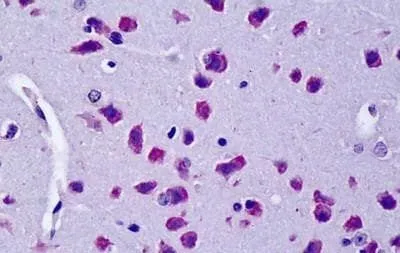
IHC-P analysis of mouse brain using GTX89126 CYLD antibody, Internal. Antigen retrieval : citrate buffer pH 6 Dilution : 5μg/ml
CYLD antibody, Internal
GTX89126
ApplicationsWestern Blot, ImmunoHistoChemistry, ImmunoHistoChemistry Paraffin
Product group Antibodies
ReactivityMouse, Rat
TargetCyld
Overview
- SupplierGeneTex
- Product NameCYLD antibody, Internal
- Delivery Days Customer9
- Application Supplier NoteWB: 0.5-1.5microg/ml. IHC-P: 5microg/ml. *Optimal dilutions/concentrations should be determined by the researcher.Not tested in other applications.
- ApplicationsWestern Blot, ImmunoHistoChemistry, ImmunoHistoChemistry Paraffin
- CertificationResearch Use Only
- ClonalityPolyclonal
- Concentration0.50 mg/ml
- ConjugateUnconjugated
- Gene ID74256
- Target nameCyld
- Target descriptionCYLD lysine 63 deubiquitinase
- Target synonyms2010013M14Rik, 2900009M21Rik, C130039D01Rik, CDMT, CYLD1, EAC, mKIAA0849, ubiquitin carboxyl-terminal hydrolase CYLD, cylindromatosis (turban tumor syndrome), deubiquitinating enzyme CYLD, ubiquitin thioesterase CYLD, ubiquitin thiolesterase CYLD, ubiquitin-specific-processing protease CYLD
- HostGoat
- IsotypeIgG
- Protein IDQ80TQ2
- Protein NameUbiquitin carboxyl-terminal hydrolase CYLD
- Scientific DescriptionThis gene encodes a protein that is a member of the ubiquitin C-terminal hydrolase subfamily of the deubiquitinating enzyme family. Members of this family catalyze the removal of ubiquitin from a substrate or another ubiquitin molecule and thereby play important roles in regulating signaling pathways, recycling ubiquitin and regulating protein stability. This protein removes ubiquitin from K-63-linked ubiquitin chains from proteins involved in NF-kappaB signaling and thus acts as a negative regulator of this pathway. In humans mutations in this gene have been associated with cylindromatosis, an autosomal dominant predisposition to tumors of skin appendages. In mouse deficiency of this gene impairs thymocyte development and increases susceptibility to skin and colon tumors. A pseudogene of this gene has been identified on chromosome 1. Alternative splicing results in multiple transcript variants that encode different protein isoforms. [provided by RefSeq, Jan 2013]
- ReactivityMouse, Rat
- Storage Instruction-20°C or -80°C,2°C to 8°C
- UNSPSC12352203


